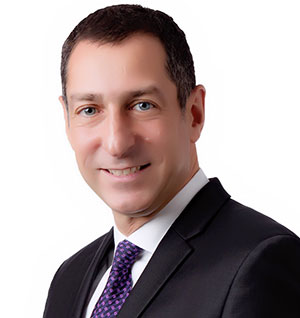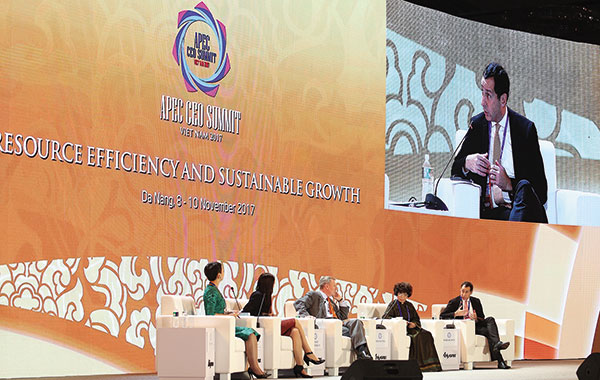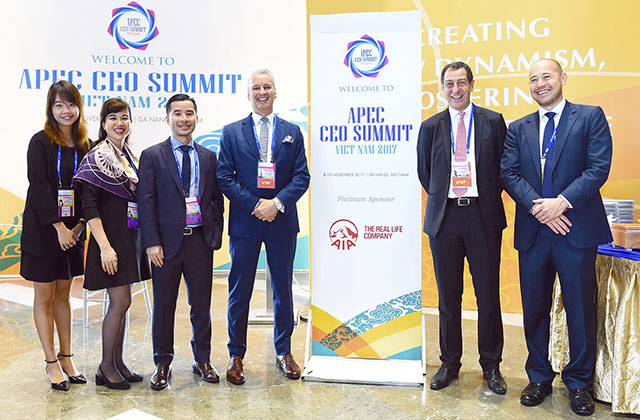AIA sees a path toward Vietnam’s future goals
 |
This is your second visit to Vietnam, and this time is more special because you are here both to attend the APEC CEO Summit and also seek more opportunities for AIA in Vietnam. What is your impression about the country’s economy?
Well, Vietnam has significantly changed, and I can see smiles on the face of everyone here. They have a lot of confidence in their future. Vietnam has a large middle-class population with a great demand for goods and services. Vietnam’s people are diligent and creative, and this will serve as an important driver for the economy.
However, the country faces some economic challenges on how to promote higher growth. We are strongly interested in how and what the government will do to drive the economy forward. I have talked about sustainability at the APEC CEO Summit, and sustainability is closely linked to the policies that the government is applying at the moment, such as sustainable tourism. This is a very important theme.
The Vietnamese government is boosting the country’s economic restructuring, with a focus laid on the financial-banking sector and state-owned enterprises (SOEs). What investment opportunities are you seeing for AIA in particular and foreign investors in general?
SOEs are an important component of the economy, but now they are crowding out small- and medium-sized enterprises (SMEs), and they receive sizeable attention from the government in terms of capital and resources. I think SOE reform must continue. Though it is painful, it is a must.
The government should allocate the country’s resources more equally, so that all players in the economy can be treated fairly. This will also help SOEs operate in a more effective and productive manner, and the return-on-equity of the economy will also improve as a whole.
Another issue of no less importance for Vietnam is reform of the banking system. Currently, the amount of non-performing loans (NPLs) remains large, affecting the quality, the balance sheet, and operations of the whole banking system.
This has prevented the private sector, including SMEs, from getting access to bank loans, and also prevented banks from offering more loans to the market. Thus NPLs must be addressed as soon as possible so that companies can borrow more money. Currently, most of the capital requirements of Vietnam’s companies are serviced by banks.
At the same time, the government should introduce more policies to attract the participation of foreign banks, which have modern technology and governance skills. They can help Vietnam improve the quality of banking reform.
Besides this, Vietnam should also look to develop a greater government bond market. Currently, we are also a large investor in the government bond market and will remain an active player.
In terms of AIA’s investments into Vietnam, we see many investment opportunities. We have completed four bancassurance partnership deals in Vietnam this year alone, including most recently with VPBank, the country’s largest joint-stock bank by market capitalisation. Earlier in the year, we also completed similar distribution deals with DongA Bank, HSBC Vietnam, and Shinhan Vietnam.
SOE reform and, specifically, the idea of listing state companies, represent an attractive opportunity for us. We will continue to look at opportunities for equity investments in quality companies and encourage an acceleration of this process.
 |
| Mark Konyn takes part in the dialogue on natural resources and their part in sustainable development |
In order to have a well-operated banking system in Vietnam, how many banks do you think are necessary?
I think the market will automatically decide on the necessary number of banks in the economy. The key issue is that capital is able to flow within the economy, and for that to happen all the banks must be financially healthy and operate transparently.
I also think that Vietnam should introduce more mechanisms to attract more international firms and banks, as they will bring international best practices into Vietnam and contribute to the development of a resilient banking system in the country.
Vietnam has and will continue to ink many free trade agreements (FTAs) with partners around the world. How will the country’s open investment and business climate and the tariff reductions under these FTAs benefit foreign investors in Vietnam?
We are a long-term investor and will focus on long-term investment in Vietnam as part of its strategy to strengthen its place in the global financial system. We have been an early investor in the government’s debt issuance, which has helped the government build out the longer-term bond market and price long-term sovereign debt instruments.
Vietnam’s participation in FTAs is laudable and shows the government’s commitment to opening up to foreign investment as part of a broader commitment to reform.
Vietnam’s commitment to the Trans-Pacific Partnership (TPP) [which is now the Comprehensive and Progressive TPP], even after the US decided to withdraw, demonstrates that the spirit of free trade persists in both Vietnam and across the APEC community.
So while our own business is largely domestic in focus, matching insurance liabilities with locally-sourced assets, the commitment to FTAs does demonstrate a strong commitment to an open business climate.
 |
In your opinion, do foreign investors feel satisfied with Vietnam’s efforts in reforming its business and investment environment? What additional policies do investors need in order to expand their businesses in the country?
One of the most attractive things for foreign investors in Asia is private equity. Private equity is a long-term investment activity so it is difficult to make an assessment over a short period of time. Private equity is private, and thus really does not involve the government.
We would like to see the government continuing the work it has undertaken to develop rules and regulations around improving the general investment environment.
As an international investor, we would welcome the opportunity to be more active in the country’s capital markets and, therefore, look forward to continued SOE reforms and deepening of the capital markets.
SMEs in Vietnam are in critical need of capital, and if the government succeeds in developing a healthy financial system to support them, SMEs will become an integral contributor to the economy.
Overall, the government’s macro policies are strong. I think one of the issues to work on is the challenge of aligning interests within the country due to the different local administrations and regions.
Are you upbeat about Vietnam’s economy and FDI attraction prospects?
Yes, I am generally optimistic about Vietnam. We believe that Vietnam’s demographics will support growth and that the country’s economic management is sound, and we believe fundamentally in the productivity of the economy. Vietnamese people want to get better, they work hard and remain ambitious.
GDP growth has been high, above 6 per cent for the past three years and likely to end this year at more than 6 per cent. Inflation is also under control, even as growth in credit – near the government’s 20 per cent target – has been high.
If there is clear leadership, I think the growth will be sustained in the long term.
How important is Vietnam to AIA’s global business strategy?
We view Vietnam as a very important market to AIA. We are very confident in the business environment and potential of the market.
Vietnam, like many of our markets in the region, is characterised by a young and growing population, fast urbanisation, and a growing level of GDP. Also, the low penetration levels of life insurance and lower levels of social welfare provision compared to western economies makes the country an ideal market to grow our business sustainably over the long term.
We strongly believe what is good for Vietnam is good for AIA, and have expressed our mission as building trust to provide better, healthier, and happier lives to the Vietnamese.
What the stars mean:
★ Poor ★ ★ Promising ★★★ Good ★★★★ Very good ★★★★★ Exceptional
Latest News
More News
- The next leap in Cloud AI (December 11, 2025 | 18:19)
- Vietnam’s telecom industry: the next stage of growth (December 11, 2025 | 18:18)
- Five tech predictions for 2026 and beyond: new era of AI (December 11, 2025 | 18:16)
- CONINCO announces new chairman and CEO (December 10, 2025 | 11:00)
- How AWS is powering the next-gen data era (December 09, 2025 | 13:14)
- Outlook in M&A solid for Singapore (December 08, 2025 | 10:31)
- Vietnamese firms are resetting their strategy for global markets (December 05, 2025 | 17:04)
- LPBank Securities accelerates AI and data innovation with AWS (December 05, 2025 | 09:00)
- Improving traceability capacity with Zebra Technologies (November 26, 2025 | 10:08)
- Ho Chi Minh City engages 500 CEOs in dialogue on building global megacity (November 25, 2025 | 16:00)

















 Mobile Version
Mobile Version